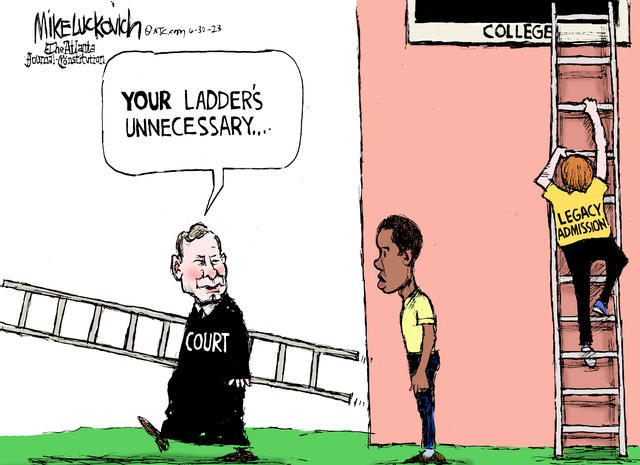
It was a seismic decision when the Supreme Court struck down affirmative action a week ago, and aftershocks are still ongoing. With the affirmative action issue settled (for the foreseeable future), many have turned their attention to legacy admissions. The Court’s decision to leave legacy admissions intact has struck many as deeply unfair. This is because affirmative action helps under-represented minority (URM) applicants whereas legacy admissions primarily benefits white applicants.
The past few days have seen multiple attacks against legacy admissions, and this post discusses whether legacy admissions is likely to survive.
The Attacks Against Legacy Admissions
There were two notable attacks against legacy admissions this week and both affect Harvard, which was a defendant in the Supreme Court affirmative action lawsuit.
- Civil Rights Suit: Only July 3rd, activists filed suit against Harvard stating that legacy admissions violates the Civil Rights Act. Their rationale is that legacy admissions unfairly boosts admission rates of mostly white children of alumni, and is therefore discriminatory to minority applicants.
- Massachusetts Tax Proposal: On July 5, Massachusetts lawmakers proposed legislation that would tax the endowment of wealthy colleges that use any of the following: Legacy admissions, early decision, or give admission preferences to donors. It would then use those taxes to fund community colleges. The lawmakers estimate that these taxes could raise over $100M per year.
These are two new body blows to Harvard’s admissions policies, and they come after not only losing the Supreme Court case, but also learning that most of the public agrees with the Supreme Court’s decision on affirmative action.
The civil rights suit serves mainly to shame Harvard into getting rid of legacy admissions. The suit is not likely to win in court as legacy (or lack thereof) is not a protected class. However, the suit is likely to win in the court of public opinion as Harvard would have difficulty trying to defend legacy admissions policy after affirmative action is gone.
The tax proposal on the other hand, attempts to hit the college’s wallet. While it also affects colleges that use early decision, I will focus upon the legacy admissions aspect here. A primary reason for legacy admissions is to encourage donations from alumni, and this tax would cut the net benefit of those donations. This legislation particularly matters because the Boston area is the nation’s capital when it comes to higher education, and contains numerous highly ranked colleges that could be subject to paying this tax.
I believe these two actions are just the start of an assault on legacy admissions. Student activists on campus may also weigh in against legacy admissions when classes resume in the fall.
Who Gives In First?
Colleges may find the public criticism of legacy admissions to be more trouble than the donations are worth, and decide to end legacy admissions. If a prominent college does that, others are likely to rapidly follow. No college will want to be the last one defending legacy admissions.
Who is likely to give in first and trigger a wave? Harvard is an obvious candidate because it is a prime target of all the criticism, and it already has the biggest endowment. But Princeton and Yale both have a larger endowment per student than Harvard and could more easily afford to give up the extra donations that legacies provide. I could even imagine Yale taking the lead here, upstaging Harvard to gather the limelight and praise for doing so, and forcing Harvard to follow.
My prediction is that legacy admissions could be gone as soon as the end of 2023 for one of the colleges listed above, with others soon to follow.
What About Other Hooks?
I have an existing post that describes hooks in detail, but in summary the surviving hooks after the Supreme Court decision are known as ALDC, which stands for Athletes, Legacy, children of Donors, and Children of faculty. The two most well known by the public are Athletes and Legacy, whereas the hooks for Donors and Children of faculty tend to fly under the radar.
There has been less outrage so far about athletic hooks, even though most recruited athletes are also white. But perhaps this is because many think of athletic talent as an earned skill that requires both talent and dedication (making it more like a “spike”An exceptional talent in an academic or extracurricular area... More) rather than the other hooks which depend purely upon which family you were born into.
But if legacy admissions falls, I could see pressure then being applied to get rid of admission preferences for children of donors, and children of faculty. I expect the admission preference for Athletes will survive even if the others are removed.




